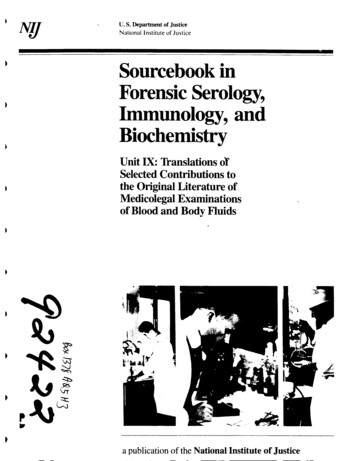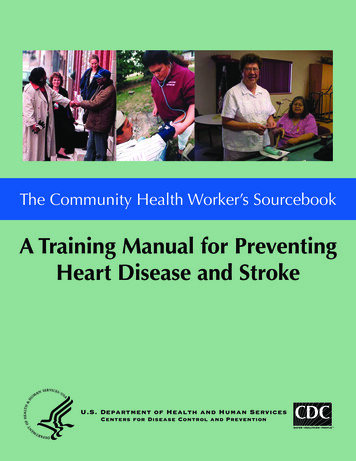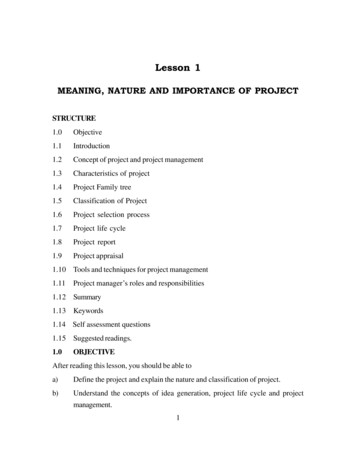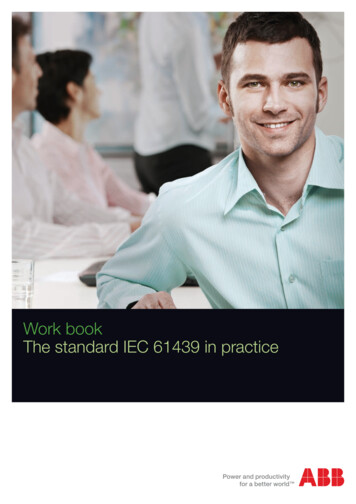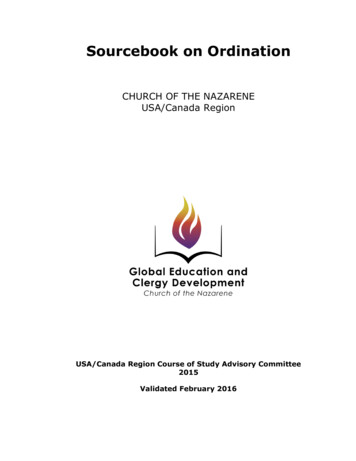
Transcription
Sourcebook on OrdinationCHURCH OF THE NAZARENEUSA/Canada RegionUSA/Canada Region Course of Study Advisory Committee2015Validated February 2016
ContentsPageIntroduction1Chapter One: The Call550.1 The Church and the Minister’s Call550.2 Categories of Ministers334Chapter Two: Educational Objectives of Ministerial Preparation551.1 Education and the Formation of the Minister551.2 Developmental Focus of Educational Preparation551.3 The Course of Study551.4 Developmental Focus in Curriculum Design551.5 Course of Study Ability Statements6689911Chapter Three: Educational Preparation552.1 The Course of Study Design and Delivery552.2 Timely Completion of the Course of Study552.3 The Educational Level of the Course of Study552.4 Educational Options for Acquiring the Desired Abilities552.5 Nazarene Higher Education and the Course of Study552.6 District-Directed Course of Study Programs552.7 Awarding Course of Study Progress to Degree/Non-Degree Hybrids552.8 Awarding Course of Study Progress for Non-Nazarene Programs151516161617181819Chapter Four: Procedures for Course of Study Validation553.1 The Goal of Validation553.2 Granting and Recognition of Validation553.3 Submission Guidelines for Validation of a Course of Study Program553.4 The Course of Study Program Validation Process553.5 Accountability Protocols: Reaffirmation and Revalidation553.6 General Assembly Mandated Revisions to Validated Programs553.7 Revising the USA/Canada Sourcebook on Ordination2020202121222323Chapter Five: The District Board of Ministry554.1 Qualifications of Board of Ministry Members554.2 Duties of the Board of Ministry Chair554.3 Board of Ministry Administrative Responsibilities554.4 Conditions for Graduation from the Course of Study554.5 Mentors and Internships554.6 Role of the Board of Ministry in Lifelong Learning24242525262627i
PageChapter Six: Candidacy for Ordination555.1 Suitability for Candidacy555.2 The Local Minister’s License555.3 The District Minister’s License555.4 District Board of Ministry Candidate Interviews555.5 Ordination555.6 Recognition of Credentials28282930313132Chapter Seven: Lifelong Learning556.1 Philosophy and Purpose of Lifelong Learning556.2 Expectation and Accountability for Lifelong Learning556.3 Exemptions from the Lifelong Learning Requirement556.4 Identifying Lifelong Learning Opportunities556.5 Recording and Reporting Lifelong Learning Hours333333343436Appendix: Forms37Global Clergy DevelopmentChurch of the Nazarene – Global Ministry Center17001 Prairie Star ParkwayLenexa, KS 66220Toll Free: 800-306-7651Email: pastor@nazarene.orgii
IntroductionWelcome to the Sourcebook on Ordination for the USA/Canada Region Church of theNazarene. If you are an education provider, this is the guide for you to create andoperate an educational program for ministry that meets the International and USA/CanadaRegion’s requirements of the Church of the Nazarene. If you are a district board ofministry member, this guide will assist you in overseeing the education of women andmen pursuing a call to ordained ministry.If you are a local pastor or candidate for ordination, a separate resource, the Handbookfor Christian Ministries, has been provided to guide you in the process of preparing forordination in the Church of the Nazarene. Both the handbook and the Regional Sourcebookon Ordination can be accessed at nazarenepastor.org.To guide each of the global mission regions of the Church of the Nazarene in the preparationand resourcing of Nazarene ministers, Manual 527.5 establishes that “All courses, academicrequirements, and official administrative regulations shall be in a regional Sourcebook onOrdination developed by the region/language group in cooperation with Global ClergyDevelopment.” Since this Sourcebook on Ordination functions as an extension of theManual, it begins with paragraph 550 thus continuing the 500 series of Manual paragraphson clergy development. The small gap in the numbering sequence between the 2013-2017Manual and the Sourcebook allows for possible expansion of this portion of the Manual (byaction of the General Assembly) without necessitating a complete renumbering ofSourcebook paragraphs.Notably, in recent years an overwhelming majority of districts on the USA/Canada Regionhave transitioned to a single District Board of Ministry. In view of this fact, references in thissourcebook to the District Board of Ministry encompass the applicable roles andresponsibilities of the District Ministerial Studies Board and District Ministerial CredentialsBoard specified in the Manual.In cooperation with Global Clergy Development, this USA/Canada Region Sourcebook onOrdination was developed by the USA/Canada Regional Course of Study AdvisoryCommittee and subsequently submitted for review to the International Course of StudyAdvisory Committee as required by Manual 527.5 (see Manual 341, 345.6-345.7 for adescription of the composition and duties of these advisory committees).The International Course of Study Advisory Committee has examined this Sourcebook onOrdination to assure its compliance with the International Sourcebook on DevelopmentalStandards for Ordained Ministers. The USA/Canada Sourcebook was subsequently endorsedby the International Course of Study Advisory Committee in November 2015 and approvedby the General Board and Board of General Superintendents in February 2016. Followingeach General Assembly, revisions to the USA/Canada Sourcebook on Ordination reflectingactions of the General Assembly as well as appropriate adaptations to cultural and societalchanges will be submitted to the International Course of Study Advisory Committee.1
In this Sourcebook, references to paragraphs in the Manual will appear as follows: Manualxxx.x (where “x” is the paragraph number). Cross-references to paragraphs in theSourcebook itself will generally appear alone (simply, xxx.x without Sourcebook precedingthe paragraph number).Questions about this Sourcebook or any of its directives should be directed to Global ClergyDevelopment (pastor@nazarene.org; 800-306-7651;17001 Prairie Star Parkway, Lenexa,Kansas 66219).2
CHAPTER ONE550THE CALLWhile affirming the universal priesthood and ministry of all believers,ordination reflects the biblical belief that God calls and gifts certain men andwomen for ministerial leadership. Ordination is the act of the Church, whichrecognizes and confirms God’s call as stewards and proclaimers of thegospel and the Church of Jesus Christ. Ordination bears witness to theChurch universal and the world at large that this candidate reveals a life ofholiness, possesses gifts and graces for public ministry, demonstrates athirst for knowledge, especially for the Word of God, and displays capacityto communicate sound doctrine. (Acts 13:1-3; 20:28; Romans 1:1-2; 1 Timothy 4:1116; 5:22; 2 Timothy 1:6-7; 5:22) [Manual, 502]550.1The Church and the Minister’s CallThe Church is the authorizing and authenticating voice, affirming the call ofGod by observing whether the called person evidences gifts and graces forministry.Local church pastors, district leaders, and Nazarene college/universityprofessors are in ideal places to identify those who, within the context ofthe community of faith, are experiencing the call of God to vocationalChristian ministry. Representatives of the Church such as these areresponsible for praying with and counseling these individuals as theydiscern and embrace the essence of their calling. Further, the local church,under the leadership of the pastor and the church board, is to providevaried opportunities for service to those who are called as well as to leadthe congregation in encouraging and mentoring them.3
550.2Categories of MinistersThe Church of the Nazarene recognizes the following categories ofministers.A. The Lay Minister. The lay minister feels called to serve in ministry butnot to become an ordained minister. Lay ministers are lay members ofthe church and may serve as full- or part-time staff members, paid orvolunteer. Certificates of Lay Ministry are issued by a local church andlay ministry is viewed as a separate educational track that does not leadto ordination. The preparation program to be a lay minister is definedand supervised by Sunday School Ministries through Continuing LayTraining rather than by Global Clergy Development. Additionalinformation on lay ministry is found in the regional Handbook forChristian Ministries and on the SDMI Ministries website,www.thediscipleshipplace.org.B. The Local Minister. The local minister feels called to serve in ministryand to pursue the preparations required for ordination. Like layministers, local ministers are lay members of the church and may serveas full- or part-time staff members, paid or volunteer, while continuingtheir preparations for ordination. A local minister is one who has beengranted a Local Minister’s License by the local church and who ispreparing for ministry under the direction of the District Board ofMinistry.C. The Licensed Minister. Licensed ministers are persons who have beengranted a District Minister’s License by their respective districtassemblies and, by virtue of the same, are members of the clergy.Licensed ministers serving in an assigned ministry as defined by theManual may administer the sacraments of Baptism and of the Lord’sSupper in their own congregations and may, unless otherwiseprohibited, officiate at marriages. Licensed ministers continuepreparations for ordination under the advice and direction of the DistrictBoard of Ministry. In cases where a licensed minister is not pursuingordination or is disqualified by reason of failing to complete preparationswithin the established time limit, a district license may be issued andrenewed annually by action of the District Advisory Board and DistrictBoard of Ministry (Manual 530.4)4
D. The Ordained Minister. Ordained ministers are members of the clergywho have completed the preparations for ministry including the requiredyears of service, and have been subsequently elected to ordination bythe district assembly and ordained as elder or deacon. The Church ofthe Nazarene recognizes two orders of ordination: elder and deacon. Anelder is an ordained minister with a call to preach as an imperativefeature of his or her calling to vocational ministry (Manual 532). Adeacon is an ordained minister with a call to vocational ministry thatdoes not necessarily include a call to preach (Manual 531).5
CHAPTER 2551EDUCATIONAL OBJECTIVES OF MINISTERIAL PREPARATION551.1Education and the Formation of the MinisterEducation for service is intended to assist the minister in “being,”“knowing,” and “doing.”“Being” involves:1. Loving God with all the heart, soul, mind, and strength and neighboras oneself as expressed in Christian holiness2. Enjoying an abiding sense of God’s call3. Relating well to the community of faith4. Maintaining integrity and honor5. Exhibiting compassion, patience, and perseverance6. Demonstrating self-discipline and self-control7. Exemplifying humility, gentleness, and sensitivity to others8. Portraying passion and courage9. Evidencing wisdom, discernment, vision and commitment“Knowing” involves:1. A knowledge of the Holy Scripture and methods of interpretation2. An understanding of Christian theology and especially the place ofChristian holiness within it3. A grasp of the history of the Christian Church and its missionthrough the centuries4. A knowledge of the Wesleyan theological heritage and traditions5. A knowledge of the disciplines of the spiritual life6. An understanding of the significance, forms, and place of Christianworship in the community of faith7. An understanding of Christian personal and social ethics6
8. A knowledge of communication theory and skills, especiallypreaching, and including teaching and interpersonal skills9. An understanding of the dynamics of Christian servant leadership,local church administration, and models of mission and ministry;and the similarities to and distinctions from secular models ofleadership and management10. An awareness of the brokenness of the human condition, bothpersonal and societal11. An understanding of the dynamics of the human life, groups withinthe local church and society, including marriage and family12. A grasp of the span of human history and culture, particularly of theminister’s own context13. An awareness of cultural trends and influences in contemporarysociety including religious pluralism14. A knowledge of the operation of the polity and practice of theChurch of the Nazarene15. An awareness of the legal framework in the society in which thecongregation functions“Doing” involves:1. Modeling a godly life and vital piety2. Thinking prayerfully about personal, familial, and congregationaldevelopment3. Acting with integrity and honor in all relationships4. Responding to others with the love of God5. Leading the people of God in worship, mission, and service6. Equipping the saints for the work of ministry7. Preaching the Word of God with clarity in a culturally appropriatefashion8. Teaching by word and example9. Evangelizing the lost10. Articulating clearly the mission of the congregation and the Church11. Ministering to the brokenness of persons and society12. Communicating the truth in love13. Listening with care and discretion14. Facilitating the ministry of all the people of God at the local level15. Organizing the local congregation as needed and appropriate16. Assessing the effectiveness of programs and plans7
17. Acquiring skills in information technology and other media essentialfor ministry and mission18. Pursuing lifelong learning551.2Developmental Focus of Educational PreparationThe educational preparation of Nazarene ministers includes the followingfour elements [see Manual, 527.3]. These elements provide a way tocategorize the primary thrust or developmental focus of each learningopportunity. Content – the biblical, theological, and historical knowledgenecessary for ministry;Competency – the development of skills for ministry;Character – the strengthening and enriching of the minister as aperson; andContext – the deepening of the understanding of the ministryenvironment.Manual 527.3 more specifically describes each of these elements andtheir value to the preparation of the minister as follows:Content—Knowledge of the content of the Old and NewTestaments, the theology of the Christian faith, and the history andmission of the Church is essential for ministry. Knowledge of how tointerpret Scripture, the doctrine of holiness and our Wesleyandistinctives, and the history and polity of the Church of theNazarene must be included in these courses.Competency—Skills in oral and written communication,management and leadership, finance, and analytical thinking arealso essential for ministry. In addition to general education in theseareas, courses providing skills in preaching, pastoral care andcounseling, biblical exegesis, worship, effective evangelism, biblicalstewardship of life resources, Christian education, and churchadministration must be included. Graduation from a validatedcourse of study requires the partnering of the educational providerand a local church to direct candidates in ministerial practices andcompetency development.8
Character—Personal growth in character, ethics, spirituality, andpersonal and family relationship is vital for the ministry. Coursesaddressing the areas of Christian ethics, spiritual formation, humandevelopment, the person of the minister, and marriage and familydynamics must be included.Context—Increased insight and understanding regarding culturalworldviews and the historical and contemporary contexts of thesocial environment where the Church witnesses. Courses thataddress the concerns of anthropology and sociology, cross-culturalcommunication, missions, and social studies must be included.551.3The Course of Study“Course of Study” serves as a descriptive term for the educationalpreparation required for ministry and ordination in the Church of theNazarene. The Course of Study is organized as a series of abilitiescorrelated to each curricular area: content, competency, character, andcontext (see 551.5).A Course of Study curriculum is a curriculum designed to develop theseabilities in those preparing for ministry. A curriculum that has beenapproved by the General Board and Board of General Superintendents is avalidated Course of Study curriculum. (Manual 527.2, 5; see alsoSourcebook 553).551.4Developmental Focus in Curriculum DesignThe grid on the following page specifies the minimum allocations to eachdevelopmental category required in the design of any Course of Studycurriculum and the possible arenas of study that must comprise eachcategory. Educational providers may adjust these percentages upwards,utilizing the undesignated percentage balance.9
Minimum Allocations in Course of Study Curriculum Design30% ContentBiblicalTheologicalHistoricalMinisterial25% CompetencyCommunication SkillsPastoral SkillsManagement SkillsAnalytical SkillsLeadership Skills10% CharacterEthical, Spiritual, & Personal GrowthIncarnational LeadershipCommitment to God and ChurchPassion for the LostCovenantal Lifestyle10% ContextInformation, System, and Environments of LearningPluralism: Religious, Historical, and CulturalCommunity InterfaceSocial, Ethical, Legal, & JudicialChurch and MinistryUndesignated—to be assigned as appropriate to the student25% and setting, or proportioned as the design of the institutionalprogram of study may dictate.10
551.5Course of Study Ability StatementsThe abilities required of any track of ministry preparation are identified inthe following statements. These ability statements also appear in theHandbook for Christian Ministries so candidates may become familiar withthem throughout their educational preparation for ministry.Programs seeking validation or revalidation should satisfy the abilitystatements listed below. Programs undergoing reaffirmation based onearlier ability statements should reference Appendix H.CONTENT: 14 Ability StatementsOLD TESTAMENTCN1 Ability to identify the literary structure, the theological concepts and mainstoryline of the Old Testament.CN2 Ability to describe the historical and cultural contexts of the major sections ofthe Old Testament.NEW TESTAMENTCN3 Ability to identify the literary structure, theological concepts and main storylineof the New Testament.CN4 Ability to describe the historical and cultural contexts of the New Testamentincluding an ability to Biblically affirm pastoral leadership of men and women withinthe Church.INTERPRETATION OF SCRIPTURECN5 Ability to describe the development of the canon and the historical andtheological influences resulting in contemporary translations.CN6 Ability to exegete a passage of Scripture using contextual, literary, andtheological analysis.THEOLOGY (General)CN7 Ability to articulate the Nazarene Articles of Faith.CN8 Ability to demonstrate an understanding of theological reflection, including itssources, its historical development, and its Wesleyan contemporary expressions.DOCTRINE OF HOLINESSCN9 Ability to articulate the doctrine of holiness from a Wesleyan perspective.CHURCH HISTORYCN10 Ability to tell the story of Christian history and the development of creeds andmajor doctrines.CN11 Ability to describe the mission and practice of the Church throughout itshistory.11
THE HISTORY AND POLITY OF THE CHURCH OF THE NAZARENECN12 Ability to identify the formative influences of the American Holiness Movementand the Church of the Nazarene.CN13 Ability to identify and explain the significance of the major events, and maleand female figures in the Church of the Nazarene.CN14 Ability to identify the directives of the Manual of the Church of the Nazarenethat pertain to the organization and ministry of the local, district, and generalchurch.COMPETENCY: 14 Ability Statements(using one ministry emphasis listed below)ORAL AND WRITTEN COMMUNICATIONCP1 Ability to communicate publicly through multiple methods (oral, written, media,etc.) with clarity, and creativity, utilizing gender inclusive language.MANAGEMENT, LEADERSHIP, FINANCE, AND CHURCH ADMINISTRATIONCP2 Ability to oversee ministry using management skills including servantleadership, conflict resolution, administration, and team building.CP3 Ability to cultivate, cast, and strategically implement vision.CP4 Ability to lead congregations in the biblical stewardship of life resources.ANALYTICAL THINKINGCP5 Ability to reason logically for discernment, assessment, and problem solving.CONGREGATIONAL CARE AND COUNSELINGCP6 Ability to provide pastoral and spiritual care for individuals and families,discerning when referral to professional counseling is required.EFFECTIVE EVANGELISM AND DISCIPLESHIPCP7 Ability to lead evangelistically through preaching, modeling and equippingothers.CP8 Ability to lead in discipling and assimilating new converts into the Church.CHRISTIAN EDUCATIONCP9 Ability to describe and apply knowledge of human development in leadingpeople to Christian maturity.CP10 Ability to envision and implement Christian education in the local church.WORSHIPCP11 Ability to envision, order, and participate in contextualized, theologicallygrounded worship and to develop and lead appropriate services for special occasions(i.e. wedding, funeral, baptism, and Lord's Supper).12
MINISTRY EMPHASIS (Preaching/Chaplain)CP12 Ability to prepare, and deliver biblically sound sermons using appropriatetechniques and skills demonstrating cultural sensitivity.CP13 Ability to develop sermons in various forms (evangelistic, pastoral care,doctrinal teaching, lectionary, etc.).CP14 Ability to assess the strengths and weaknesses of current homiletical modelsin light of enduring theological and contextual perspectives.MINISTRY EMPHASIS (Christian Education/Children/Youth/Adults)CP15 Ability to prepare and lead discipleship ministries that are biblically sound,age-appropriate, intergenerational, and culturally sensitive.CP16 Ability to assess contemporary approaches to ministry in light of enduringtheological and contextual perspectives.MINISTRY EMPHASIS (Compassionate Ministry)CP17 Ability to prepare and lead compassionate ministries that are biblically soundand culturally sensitive.CP18 Ability to exegete a community utilizing a Wesleyan paradigm for hospitableengagement.MINISTRY EMPHASIS (Music)CP19 Ability to prepare and lead a music ministry that is biblically sound, utilizingappropriate techniques and skills demonstrating cultural sensitivity.CP20 Ability to assess contemporary approaches to church music in light of enduringtheological and contextual perspectives.MINISTRY EMPHASIS (Administration)CP21 Ability to manage and implement biblically sound church administrationutilizing appropriate techniques and skills demonstrating cultural sensitivity.CP22 Ability to assess and implement contemporary approaches to administration inlight of enduring theological and contextual perspectives.CHARACTER: 8 Ability StatementsCHRISTIAN ETHICSCH1 Ability to apply theological and philosophical ethics to nurture faithful living inthe Christian community.CH2 Ability to discern and make ethical decisions in the midst of a complex and/orparadoxical context within a Wesleyan frameworkCH3 Ability to practice a moral pastoral leadership, informed by philosophical andtheological ethics.13
SPIRITUAL FORMATIONCH4 Ability to pursue holy character (Christlikeness) by practicing faith formationand the classic Christian disciplines as means of grace.CH5 Ability to locate, understand, and use resources for individual and corporatespiritual formation.PERSON OF THE MINISTERCH6 Ability to articulate his or her call from God to ministry as affirmed by theChurch.CH7 Ability to demonstrate a realistic self-understanding including personalstrengths, gifts, weaknesses, and areas of needed growth.CH8 Ability to practice holistic stewardship (mutual submission in genderrelationships, sexual purity, marriage and family, personal finance, professionalconduct, practicing Sabbath, etc.).CONTEXT: 8 Ability StatementsANTHROPOLOGY AND CROSS-CULTURAL COMMUNICATIONCX1 Ability to understand, appreciate, and work sensitively with cultures and subcultures.CX2 Ability to identify and apply the principles of cross-cultural communications.CONTEMPORARY CONTEXT AND SOCIAL ENVIRONMENTCX3 Ability to discern sociological dynamics, (including the power dynamics ofgender, age and ethnicity) and to apply that information to specific ministry settings.CX4 Ability to analyze and describe congregations and communities.HISTORICAL CONTEXTCX5 Ability to place the ministry context in light of the large schemes of world andnational history.CX6 Ability to analyze and describe the ministry context in light of its local history.MISSIONSCX7 Ability to understand and articulate the biblical, historical, and theological basesfor Christian mission.CX8 Ability to describe basic missiological principles and to apply them to thedevelopment of ministry in the local church.14
CHAPTER THREE552EDUCATIONAL PREPARATIONEven as Christ spent His public ministry proclaiming the kingdom of Godand equipping His disciples for mission and ministry, the Church of theNazarene believes a call to the ministry is also a call to prepare. Asignificant part of the preparation is education. For this reason, from itsbeginning, our church established institutions and systems of education.552.1The Course of Study Design and DeliveryAs noted above (551.5), the Course of Study is organized as a series ofabilities correlated to each curricular area: content, competency, character,and context. A Course of Study curriculum is one designed to develop theseabilities in persons preparing for ministry in the Church of the Nazarene.While the Manual allows cultural adaptations to meet the needs of ministersall around the globe, there is but one Course of Study. These expressionsare represented by curricula reviewed by the Regional Course of StudyAdvisory Committee (RCOSAC) and validated by the International Course ofStudy Advisory Committee (ICOSAC), General Board, and Board of GeneralSuperintendents.The Course of Study is distributed through college classrooms, collegeextension programs, online and distance programs, ministry trainingcenters, and district-directed groups led by ordained ministers. The role ofthe local church is vital to the educational preparation of the candidate asnoted in Manual 527.3: “Graduation from a validated course of studyrequires the partnering of the educational provider and a local church todirect students in ministerial practices and competency development”.15
552.2Timely Completion of the Course of StudyFrom the granting of the first district license, a period of 10 years is allowedfor the completion of a validated Course of Study. Exceptions to the 10-yearlimit may be granted by the District Board of Ministry subject to theapproval of the general superintendent in jurisdiction. Individuals failing tocomplete the Course of Study within this time frame or within the limits ofany approved exception may be granted renewal of a district license butshall not be eligible for ordination (Manual 530.4).552.3The Educational Level of the Course of StudyEach Course of Study curriculum, however delivered, must be equivalent tothree years of full-time, college-level study. The Course of Study, then, is asignificant educational experience that requires time and effort to complete.For this reason, within the United States and Canada the educationaloptions for preparing for ministry assume students have a high schooldiploma or equivalent. Consequently, the District Board of Ministry must beprepared to help candidates acquire the skills essential to their successfulcompletion of the Course of Study.552.4Educational Options for Acquiring the Desired AbilitiesThe Course of Study is designed to assist the candidate in developing aprescribed set of abilities essential to effective ministry. To this end, theChurch of the Nazarene offers a flexible approach in preparing women andmen whom God is calling to ministry. Regardless of the educational pathpursued, the District Board of Ministry is to evaluate annually the progressof each candidate toward completion of a validated Course of Study. GlobalClergy Development and Nazarene higher education institutions can provideassistance to District Boards of Ministry seeking options for validatedprograms including those preparing for ministry whose first language is notEnglish.Validated Degree Programs. Educational preparation for ministry in theChurch of the Nazarene is well-served by a liberal arts bachelor’s degreefrom a Nazarene college/university and a graduate degree from NazareneTheological Seminary. At least one of these degree programs must bevalidated in order for candidates to have satisfied the educationalrequirements for ordination.16
Another path for completing a validated degree program is offeredthrough Nazarene Bible College and is particularly suited to individualsanswering God’s calling later in life. For candidates whose educationalpreparation for ordination is through a district training center, a degreecompletion option is also available through Nazarene Bible College if thetraining center uses validated Nazarene Bible College materials and hasagreed to be accountable to the college’s instructional standards.Validated Non-Degree Programs. While all candidates are stronglyencouraged to pursue a path of educational preparation that includesearning an academic degree, the completion of a validated, non-degreeprogram also meets the educational requirements for ministrypreparation and, in certain circumstances, may be the appropriaterecommendation of the District Board of Ministry. The Modular EducationProgram provides the backbone of validated non-degree avenues foreducational preparation. Global Clergy Development administers t
1 Introduction Welcome to the Sourcebook on Ordination for the USA/Canada Region Church of the Nazarene. If you are an education provider, this is the guide for you to create and operate an educational program for ministry that meets the International and USA/Ca



